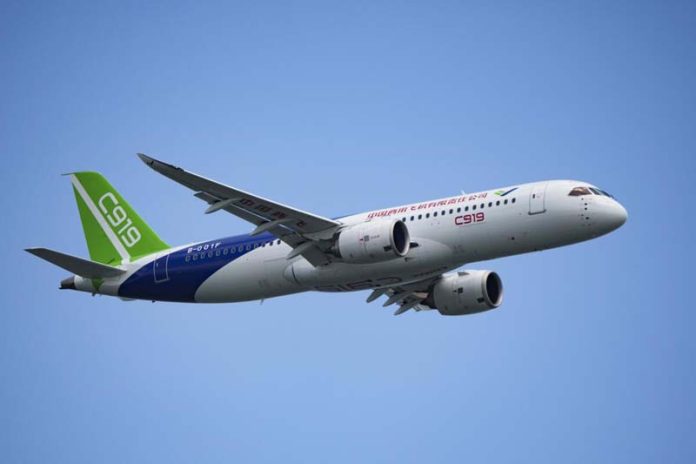SINGAPORE, Feb 26: China’s C919 single-aisle jet made its international debut at the Singapore Airshow, attracting masses of visitors and hundreds of orders, but analysts say it still has a long way to go before it can compete with aircraft from market leaders Boeing and Airbus.
The Commercial Aircraft Corp. Of China –- also known as COMAC — has received over 1,000 orders for the jet, mostly from Chinese airlines.
A lack of international certification means the aircraft cannot operate commercially in most countries unless they recognise certifications by China’s civil aviation regulator.
Over the course of last week’s airshow, which drew over nearly 120,000 trade and public visitors, the C919 performed fly-pasts, allowing visitors to see the jet in action. Its only previous foray outside mainland China was to Hong Kong in December.
“It’s quite symbolic and a major milestone in that push by China to become considered, alongside Airbus and Boeing, for commercial aircrafts,” said Brendan Sobie, an independent aviation analyst based in Singapore.
COMAC aims to compete with companies like Boeing and Airbus in the single-aisle jet market. But first, the C919 has to be certified internationally, he said.
The plane is currently certified only in China, where China Eastern Airlines are operating four C919 aircrafts. A lack of international certification means the C919 cannot operate in most countries unless they recognize certifications by China’s civil aviation regulator.
Another aspect COMAC needs to work on before its jets can become serious contenders alongside the Airbus A320neo and Boeing’s 737 Max narrow-body airliners is building up a reliable distribution system and market support services for its aircraft.
“Most of the orders come from Chinese airlines and the challenge moving forward is that in order to have a sustainable future, COMAC must demonstrate that they are able to go beyond Chinese shores,” said Mabel Kwan, managing director at consultancy Alton Aviation.
COMAC declined to make its executives available for an interview.
So far, the state-owned company says it has received 1,061 domestic orders for the C919, but it has yet to secure many international customers.
Brunei-based GallopAir, which is backed by Chinese investors, signed a letter of intent in September to purchase 30 aircraft from COMAC, including a C919 jet, in a deal estimated to be worth USD 2 billion.
COMAC faces supply chain challenges similar to those of Boeing and Airbus, which currently have backlogs of thousands of aircraft yet to be delivered. While the C919 is designed in China, much of its technology and many of its parts are from foreign suppliers. Its engine, for example, is made by CFM International, a joint venture between GE Aerospace and France’s Safran Aircraft Engines.
“It’s not like China has its own supply system, its own avionics, its own engines, so that they’re not impacted by what’s happening globally,” Sobie said, adding that COMAC might not be a high priority for suppliers also struggling to catch up with deliveries to Boeing and Airbus.
COMAC however does have the luxury of a wide talent pool from China, Kwan said, and in the long run this may allow the firm to develop more homegrown technology and parts for use in its aircraft.
“Right now, COMAC is using mostly Western technology … but with enough research & development, training and education, the whole ecosystem may be able to overcome (challenges in the long term),” she said.(AP)


